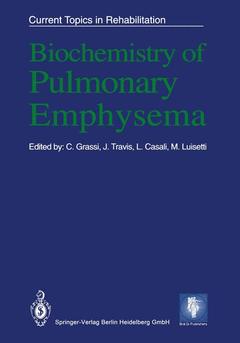Description
Biochemistry of Pulmonary Emphysema, Softcover reprint of the original 1st ed. 1992
Current Topics in Rehabilitation Series
Coordinators: Grassi C., Travis J., Casali L., Luisetti M.
Prefaced by: Corsico R.
Language: English
Subjects for Biochemistry of Pulmonary Emphysema:
Publication date: 04-2014
200 p. · 17x24.4 cm · Paperback
200 p. · 17x24.4 cm · Paperback
Description
/li>Contents
/li>
Pulmonary emphysema is a disease which develops because of a localized imbalance between endogenous proteinase inhibitors and proteinases leaking from neurophils during phagocytosis at inflammatory foci within the lung. This volume not only reviews at a biochemical level what is known about the natural inhibitors and proteinases involved in connective tissue destruction within the lung, but also suggests novel methodologies for reestablishing proper enzyme-inhibitor balance, including the use of natural or synthetic inhibitors for supplementation or gene therapy.
From the Contents: Pulmonary Emphysema: What's going on.- Elastin and the Lung.- An Introduction to the Endopeptidases.- Lung Proteinase and Emphysema.- Multiple Functions of Neutrophil Proteinases and their Inhibitor Complexes.- Kinetics of the Interaction of Human Leucocyte Elastase with Protein Substrates.- Proteinase Inhibitor Candidates for Therapy of Enzyme-Inhibitor Imbalances.- Antileucoprotease (Secretory Leucocyte Proteinase Inhibitor), A Major Proteinase Inhibitor in the Human Lung.- Development and Evaluation of Antiproteases as Drugs for Preventing Emphysema.- Genetic Control of Human Alpha-1-Antitrypson and Hepatic Gene Therapy.- Neutrophils, Neutrophil Elastase and the Fragile Lung.
© 2024 LAVOISIER S.A.S.




